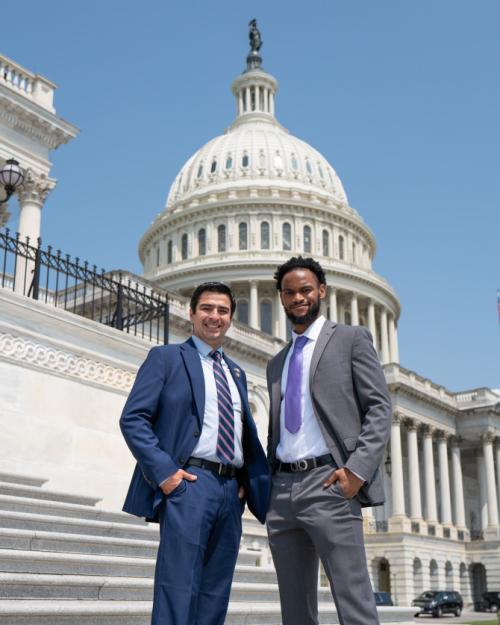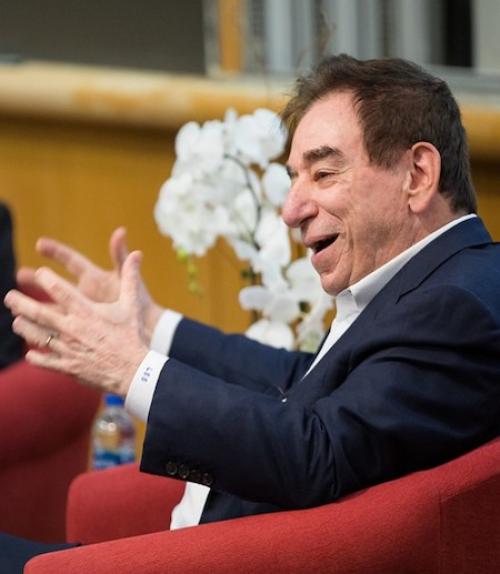If a budding entrepreneur ever needed a lesson in the power of persistence, the story of Dr. Leonard Schleifer ’73 would be a good one to hear.
Schleifer, the 2019 Cornell Entrepreneur of the Year who majored in biological sciences as a Cornell undergrad, shared the successes and failures he experienced while growing his biotechnology company, Regeneron, during an April 11 conversation with Lance Collins, the Joseph Silbert Dean of Engineering. Schleifer was on campus to be honored during Celebration, Entrepreneurship at Cornell’s annual two-day conference.
“I have this notion that as long as I can see some light, no matter how long the tunnel is, I am willing to get back on the horse,” Schleifer said, after showing a graph that depicted his company’s profits and losses over the years. He called the graph “26 years until we made more money than we spent.”
“We fell down three times,” Schleifer said, “but somehow it just seems like failure is part of the research game, just as it’s part of life.”
Today, Regeneron is one of the world’s leading biotech companies, with seven FDA-approved treatments and 20 experimental medicines to help patients with eye disease, heart disease, allergic and inflammatory diseases, pain, cancer, infectious diseases and rare diseases.
Regeneron was founded 30 years ago after Schleifer – then an assistant professor of neurology at Weill Cornell Medicine – noticed that all of the interesting research he was reading came from companies like Genentech.
“I went to my mentor and said, ‘What about starting a company to take on neurologic diseases?’” Schleifer said. “[He] said, ‘That’s a stupid idea. Get back in the lab and do something good.’”
Schleifer was undeterred (“I’m fairly stubborn,” he said) and he moved ahead, raising $1 million in venture capital and filling his board with physicians and scientists.
“The science had to drive everything that we did,” he said.
Originally tackling two drugs for Lou Gehrig’s disease, then another focused on obesity, the company was running out of money, but continued to hunt for breakthrough drugs.
They hit the jackpot with Eylea, a drug to treat macular degeneration and other eye diseases; Dupixent, which treats atopic dermatitis and asthma; Libtayo, which targets squamous cell cancer of the skin; and four other drugs.
“Our success is measured in the patients we’ve helped,” Schleifer said, as he shared some success stories: a man about to enter hospice care whose tumors went away after six weeks, allowing him to return to a normal life; and a young girl who had a debilitating skin condition covering most of her body and is now able to enjoy her life.
Schleifer touched on creating “miracles,” and the need for entrepreneurs in his field to be more interested in a promising lab discovery that might not bring in money for five to 10 years than the latest sales figures for an existing drug.
He also shared some advice for startup founders.
“Young entrepreneurs aren’t lacking brains, enthusiasm or commitment, but the one thing they’re lacking is experience,” he said. “It’s important to recognize that you don’t know everything and to find people who have that experience and are willing to work with you and teach you.”
He also emphasized the importance of finding good partners and the willingness to do things your own way and stick to your convictions, even when the markets or the industry say otherwise.
“This is a great country that is willing to finance good ideas,” he said. “But you have to be persistent and pound the pavement.”
Schleifer, who received his medical degree and a doctoral degree in pharmacology from the University of Virginia, founded Regeneron in 1988 and is its president and CEO and a board member. He is also a licensed physician, certified in neurology by the American Board of Psychiatry and Neurology.
This story also appeared in the Cornell Chronicle.




